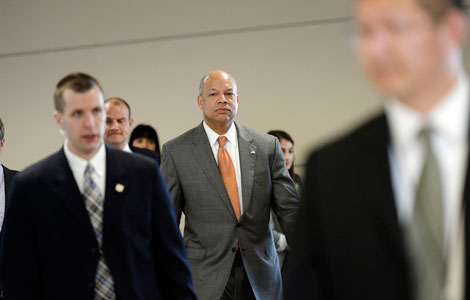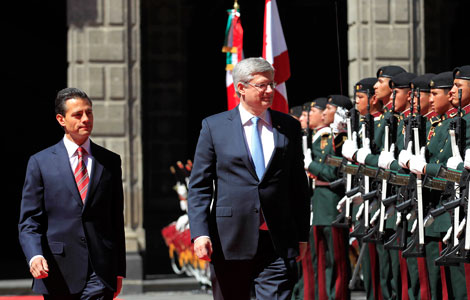

|
Chinese Foreign Minister Wang Yi meets Egyptian Foreign Minister Nabil Fahmy at United Nations headquarters in New York on Monday on the sidelines of the 68th session of the UN General Assembly. Hu Haidan / China Daily |
Chinese Foreign Minister Wang Yi said China and Africa have always been a community of shared destinies and that neither side can grow without the other.
Wang made the remarks on Monday at the third round of political consultations between Chinese and African foreign ministers held at United Nations headquarters. Wang was attending the 68th UN General Assembly and is scheduled to speak there on Friday.
"No matter what changes take place in the international situation, China will stand side by side with its African brothers and sisters," said Wang, who accompanied Chinese President Xi Jinping on a trip to Africa in late March, less than two weeks after the new government was inaugurated.
Wang described it as unprecedented for a Chinese president to make Africa the destination for a first trip abroad. "It sent a strong message to the world that China is paying top attention to Africa and is actively promoting cooperation there," said Wang.
The African trip took Xi to Tanzania, South Africa and Republic of the Congo, during which he met some 20 African leaders.
According to Wang, Xi's trip achieved fruitful results in enhancing friendship, increasing mutual trust, promoting cooperation and seeking common development.
Meanwhile, about 10 leaders from African nations have paid visits to China in the past six months.
"The new type of strategic partnership between China and Africa has reached a new starting point. It is moving forward at full steam and promising bright prospects," Wang told the more than 100 participants in the Monday meeting.
He described Africa as a continent full of hope, where more than 1 billion Africans are working to realize their dreams of development and rejuvenation.
"China and Africa have always been a community of shared destinies. China's development cannot succeed without Africa and Africa's development cannot succeed without China," he said.
China is now Africa's largest trading partner. Bilateral trade approached $200 billion in 2012. Meanwhile, Chinese direct foreign investment in Africa reached $15 billion by the end of last year.
Writing in China Daily late last month, Asha-Rose Migiro, former deputy secretary general of the United Nations, said Africans and Chinese have much in common in their dreams.
She praised President Xi for China's "commitment to connecting its development with that of Africa, aligning the interests of the Chinese people with those of the African people, and combining China's development opportunities with those of Africa".
"It is in this regard that the Chinese dream has received immense appeal in Africa. It conjures a vision of collective achievement and resonates with the continent's dream," said Migiro, a former foreign minister of Tanzania.
"We in Tanzania know that the Chinese dream espouses the same objectives that we are striving to reach - poverty alleviation, economic growth and attainment of sustainable development as articulated in the country's National Development Vision 2015," she said.
Migiro praised the Forums for China-Africa Cooperation (FOCAC) as a "workable tool" between China and Africa, and described it as "based on the principles of equality, mutual trust, win-win cooperation and two-way cultural exchanges, among others".
Migiro believes China's growth trajectory and intensified Sino-Africa relationship offer several unprecedented opportunities for both sides.
She rebuked the saying that China and other emerging economies are in Africa just to grab resources, citing recent figures from the United Nations Conference on Trade and Development (UNCTAD) which show that about 75 per cent of the value of the BRICS foreign direct investment projects in Africa for the period 2003 to 2012 were in the manufacturing and services sectors. Only a meager 10 per cent and 26 per cent of the number and value of projects, respectively, were channeled to natural resources.
In a recent co-authored paper, Fantu Cheru, an Ethiopian economist, and Cyril Obi, a Nigerian political scientist, argued that China has become Africa's preferred partner at a time when Africans are engaged in a major soul-searching exercise to find out what went wrong with Africa's development in the past half century.
The two believe China's development experience is attractive to Africans, and lending with no strings attached has helped build much-needed infrastructure, which Western policy lending has not done.
"China's view of a dynamic Africa also contrasts sharply to the West's doom and gloom analysis of Africa," they wrote.
Contact the writers at [email protected] and [email protected]
(China Daily USA?09/24/2013 page1)









